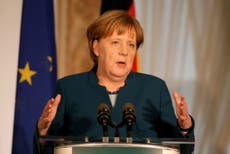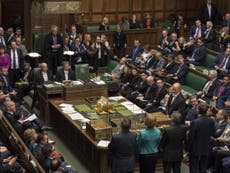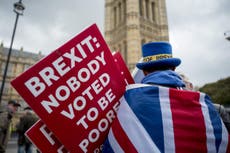The House of Commons being a washout – literally, via a mysterious leak from (rather than to) the press gallery – attention has turned once again to the Irish border issue, the most intractable of the many obstacles to Brexit.
Angela Merkel arrived in Dublin to ask what the Irish prime minister, Leo Varadkar, described as “reasonable questions” about what might happen under a no-deal Brexit.
The chancellor of Germany has pledged prevent no deal “to the very last hour” but she is still curious, in a prudent, practical sort of way, about the European Union’s new external border with a non-member state (Britain) in the event of a hard Brexit.
Indeed, her reasonable questions could also be posed about the border between Northern Ireland (the UK) and Ireland (the EU) after the transition period, that is if a withdrawal agreement is ever ratified.
When the transition period runs out, and if there are no other technological solutions to the problem, then the UK and EU will have to share a customs union indefinitely – something that one or other or both sides might find intolerable eventually. If so, then the question of the border will arise once again.
Ms Merkel, for example, is entitled to enquire about the notorious American chlorinated chicken. What will the safeguards be, for example, if a future British government wishes to import these celebrated delicacies from the US under a new free trade deal? How would the integrity of the EU’s external border and its single market be protected from such an incursion? What will be done by the Irish government to safeguard Europe’s border and stop these birds, which violate European standards, being transported across the notoriously porous UK-Irish frontier?
The British claim that they would never import such food, but who knows what regulatory divergence might happen over the years? How can the EU be expected to leave its back door open and hope for the best?
If the Irish show reluctance to put up new barriers to freedom of movement of people or poultry because of their history, that is entirely understandable. No one wishes them to. There would be bloodshed. Chancellor Merkel listened intently to the stories of people from the north and around the old border “bandit country” who had suffered in the Troubles. Her own experience growing up in East Germany heightens her sense of the potency of walls and barriers.
Yet what is the reasonable answer to the reasonable questions that Ireland’s EU partners are asking about future border arrangements? They cannot be avoided entirely: they exist, by comparison, between Sweden (EU) and Norway (non-EU), and Bulgaria (EU) and Turkey (non-EU).
If, say, the Irish simply refuse to put up any border controls, either at the border itself or away from it, then what is the EU supposed to do? It is difficult to imagine a multinational EU border force patrolling the lanes and fields of Ulster with a view to interrogating people going about their lawful (or not) business, and the UK and Ireland are supposed to have a free travel area in any case, something that has existed since Irish independence a century or so ago.
The expectation is that workers, tourists, students, vehicles, livestock and goods of all kinds will be able to pass without let or hindrance.
In reality, then, the EU must be edging towards the condition that they cannot have a hard border in Ireland, and therefore, though it may irk them, they can never set the British a deadline for Brexit if it means no deal. A settlement has to be found, even if it may take a long time. The Irish border is as tricky a problem for the French and Germans as it is for the Irish and the British – a conundrum with no known answer.
So a hard border, and therefore a no-deal Brexit, is in reality unthinkable. In every centre of power – Westminster, Stormont, Dublin, Paris, Berlin and Brussels – the thought is slowly crystallising that a no-deal Brexit is at best a purely theoretical possibility. The British have virtually outlawed it; and the Europeans cannot override Ireland’s objections or the legal and moral force of the Good Friday Agreement.
Without the possibility of a no-deal Brexit, that only leaves two possibilities, amounting to the same thing: Brexit is over.
The first is that the EU grants the UK a never-ending series of extensions to Article 50 until the reality that leaving the bloc is a practical impossibility becomes apparent to even the most truculent Brexiteer. Rather like the way in which Turkey was promised the right to enter the EU back in 1961 but all concerned have never quite got around to organising it, so too with Brexit – a permanent question mark over Britain’s membership of the EU, from which neither side can disentangle itself.
The second option is that the UK simply revokes Article 50, recognising at long last that the Brexit project is collapsing under the weight of its own logical contradictions. We should have seen it coming.







Join our commenting forum
Join thought-provoking conversations, follow other Independent readers and see their replies